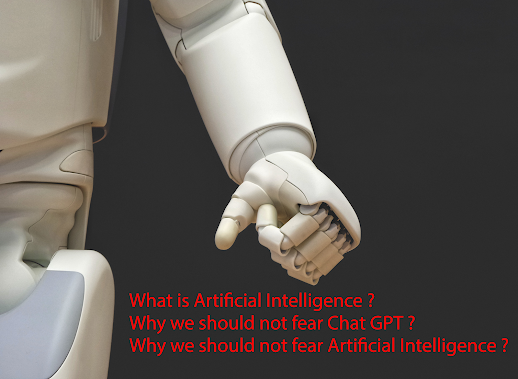What is Artificial Intelligence?
Artificial
Intelligence (AI) is the simulation of human intelligence in machines that are
designed to think and act like humans. It involves the creation of computer
systems that can perform tasks that typically require human intelligence, such
as visual perception, speech recognition, decision-making, and language
translation.
There are
different types of AI, including narrow or weak AI, which is designed to
perform a specific task, and general or strong AI, which can perform any
intellectual task that a human can.
The
development of AI is based on the idea that a machine can be made to learn
from experience, just like a human, and that it can use this learning to
make predictions or decisions. This is achieved through a combination of machine
learning, which involves teaching a machine to recognize patterns and make
decisions based on that data, and deep learning, which involves training
a machine to make decisions based on complex, multi-layered data sets.
AI aims to create
machines that can operate with the same level of intelligence as a human,
eventually surpassing it. AI has the potential to revolutionize many industries
and transform our lives in countless ways, and it is an active area of research
and development in computer science, engineering, and other fields.
Why we should not fear Artificial
Intelligence
Artificial
Intelligence (AI) has been a topic of discussion for decades, with many people
expressing concerns about its potential impact on society. However, despite
these concerns, AI has the potential to greatly benefit humanity. Here are 15
reasons why we shouldn't be afraid of AI:
· AI can enhance healthcare: AI can help medical professionals diagnose and treat diseases more effectively by analyzing vast amounts of patient data and suggesting personalized treatment plans.
· AI can help tackle global problems: AI can help us solve some of the world's biggest problems, such as climate change, poverty, and inequality, by providing insights and solutions that humans may not have considered.
· AI can improve safety: AI can be used to develop systems that can help prevent accidents and protect people in high-risk situations, such as self-driving cars and disaster response systems.
· AI can augment human abilities: AI can augment our abilities and enhance our creativity by providing us with new tools and insights that we can use to solve problems and create new solutions.
· AI can provide better customer service: AI-powered catboats and virtual assistants can provide quick and efficient customer service, helping companies improve their customer experience.
· AI can improve decision-making: AI can help individuals and organizations make better decisions by analyzing large amounts of data and providing insights and recommendations.
· AI can increase accessibility: AI can be used to develop tools and technologies that can help make the world more accessible for people with disabilities.
· AI can reduce bias: AI can help reduce human biases by providing objective and data-driven insights and recommendations.
· AI can improve education: AI can help students learn more effectively by providing personalized education experiences and offering new and innovative teaching methods.
· AI can enhance security: AI can be used to develop advanced security systems that can detect and prevent cyber threats and protect sensitive information.
· AI can improve transportation: AI can help make transportation safer and more efficient by enabling the development of self-driving cars and smart transportation systems.
· AI can enhance creativity: AI can be used to develop new and innovative tools and technologies that can help enhance human creativity.
· AI can improve environmental sustainability: AI can help reduce waste and minimize the negative impact of human activities on the environment by providing insights and solutions that can help promote sustainability.
· AI can promote equality: AI has the potential to help reduce inequality by providing access to new opportunities and resources that may have been previously unavailable.
In conclusion,
AI has the potential to greatly benefit humanity and improve our lives in many
ways. By embracing AI and working to ensure that it is developed and used
responsibly, we can ensure that it becomes a positive force for change in the
world.
Why we should not fear Chat GPT
There are
several reasons why one should not be afraid of using Chat GPT as an AI tool:
· ChatGPT is only as good as the data it was trained on: The quality of the output generated by ChatGPT is only as good as the data it was trained on. OpenAI has taken care to train the model on diverse and well-vetted data to ensure that its outputs are accurate and unbiased.
· ChatGPT operates within defined parameters: ChatGPT is programmed to operate within specific parameters and cannot do anything outside those parameters. For example, it cannot perform purchases or access sensitive information.
· ChatGPT can be monitored and regulated: Because ChatGPT is a product created by OpenAI, the company can monitor its usage and make changes to its algorithms to ensure that it operates within ethical and legal parameters.
· ChatGPT can be a valuable tool for businesses and individuals: ChatGPT can be a valuable tool for businesses and individuals to perform tasks like answering customer questions, generating content, and more.
Overall,
ChatGPT is a powerful language model that has the potential to be a valuable
tool, but it should be used responsibly and within defined parameters.
Marketing Tips: The future of Marketing is people
Febspot: How to start earning on Febspot without monetization.








0 Comments